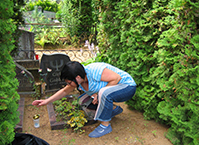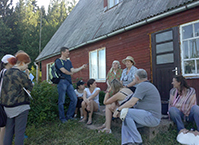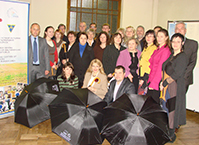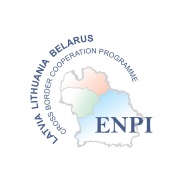The beer traditions
Categories: Dagnija Bramane
You mentioned that when beer is made then there are many related doings, traditions. Maybe you could tell me what these traditions are and where they are carried out, where you live, where it all is?
The traditions make a part of the very beer making process, but all of them are not aimed at making beer, it is rather the whole process that is like a ritual and it has various traditions. For example, the must has to be given to all family members to taste, then every person decides whether it is good; then it is given to the oldest person and he usually expresses his opinion about the must. Nobody even knows why it should be done, but everybody does it because it is established this way. Another habit is when people count how much beer they want to make, then they count buckets; and traditionally, as if from olden times, we have preserved the tradition that the number of buckets that are filled in is written not on a piece of paper, but rather drawn with a piece of coal on the wall of the bathhouse. And then, if, let’s say, four buckets are poured, then four lines are drawn; and after that they think how much more is necessary. And for beer to ferment better, crosses are made from straws and thrown into the beer tubs for the beer to be protected and the whole process to be successful. When beer is being filtered, kids are usually invited; they have to help and hold the gauze. Another process is tasting beer; then again everybody has to taste what beer has been made. And when it comes to drinking beer, also then traditionally, at least in our family, beer is poured out from that wooden barrel and poured into the so-called, it’s difficult to say, into such a beer mug, which is then taken around and beer is distributed. The whole process of making beer is traditional and has been preserved from the past.
What about your family – you said that it was done in this way in your family. Where do you live? Where is your home?
Our home is in the area of Vārkava, Rožkalni civil parish, not far from the river Dubna.
Audio
Researcher: Dr. philol. Valentīns Lukaševičs, Daugavpils Universitāte










